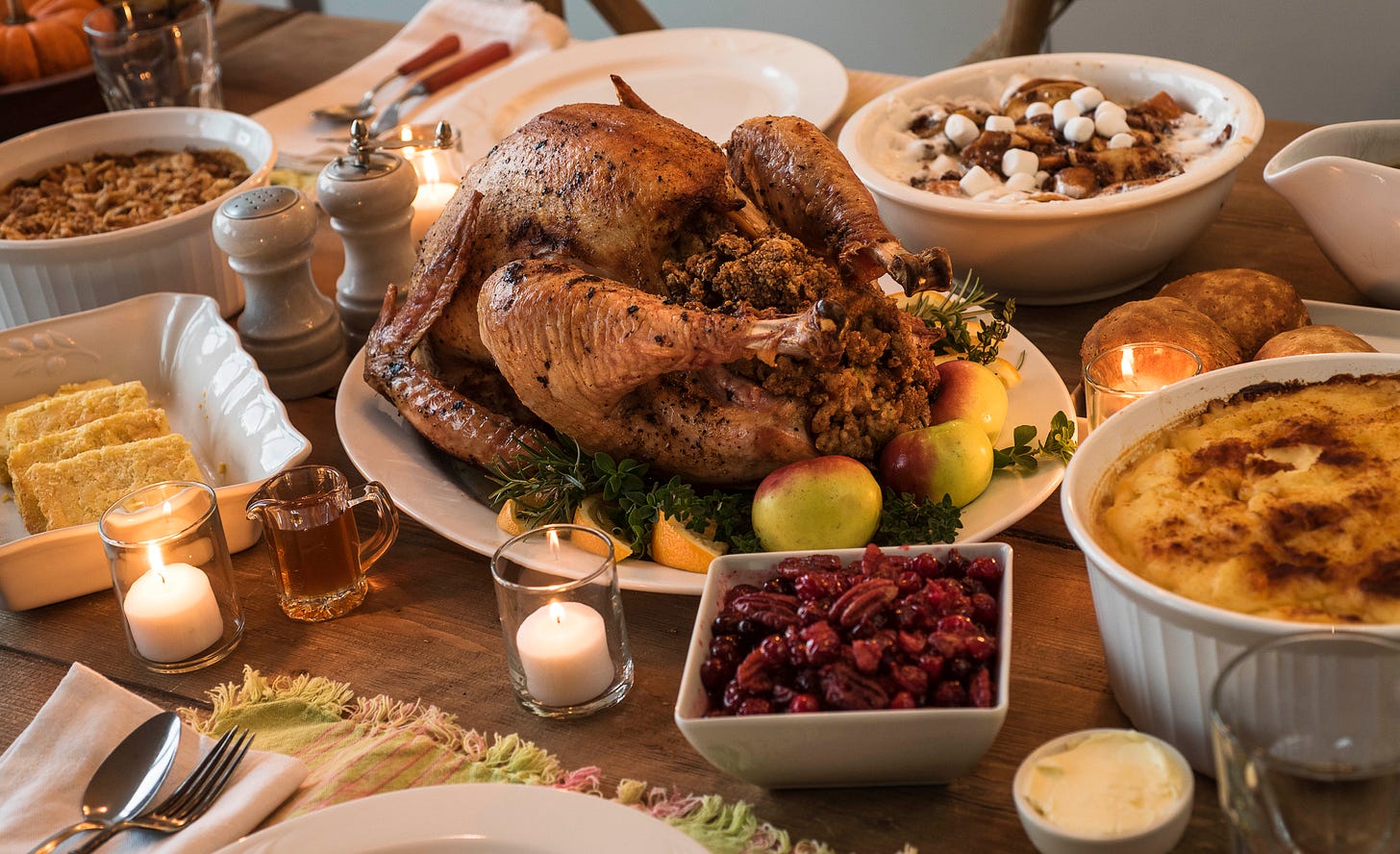When I had only lived in the United States for a couple of months, I met a new acquaintance for coffee. We had a nice conversation about literature and grad school, about New York City and smoked fish. As I was taking my leave, she off-handedly asked me what my plans were for Thanksgiving.
“Oh,” I said, not quite sure what to say. “I don’t really celebrate Thanksgiving.”
“What do you mean, you don’t celebrate Thanksgiving?” she asked, barely trying to hide her incredulity.
“I’ve never been in the States for the holiday before,” I offered, suddenly feeling self-conscious. “I… haven’t really made any plans.”
“Oh, that’s simple, then,” she declared. “You can’t be on your own for Thanksgiving!”
A week later, I was at her parent’s house in upstate New York, sitting between her grandfather and a friend of her brother’s who wasn’t able to make it home for the holidays. In all, about twenty five people had gathered, including members of the nuclear family, some more distant relatives, and about a dozen friends.
I had a wonderful time. The company was excellent. The drinks were plentiful. The food was delicious—even though, to this day, I remain glad that I only need to eat turkey once a year.
There is something to the rhythm of a Thanksgiving dinner that creates and fosters connection. The trickle of people arriving throughout the late morning. The anticipation for the meal as the smell of the roast makes a house feel homely. The hours spent talking to whoever happens to sit next to you at the dinner table. And finally, perhaps the most important part, the low-pressure sociability mediated by food coma and a sports game playing on the TV.
That day was the start of my conversion. Ignorant about the nature or the purpose of the holiday when I first arrived on American shores, I have since embraced Thanksgiving as my favorite holiday. And as I reflected on what it is about Thanksgiving that is so special to me over the course of the years, I gradually came to recognize that I see it as an embodiment of a distinctly American sense of community: one that cherishes the strong ties we didn’t choose while embracing the ones, strong or weak, that we do.
Christmas tends to be an exclusive affair. Most Americans celebrate it within the nuclear family. While you might invite a child’s significant other or a lonely great-aunt to join the family fold, its invitees are mostly restricted to the people depicted on the main branch of one family tree.
New Year’s Eve tends to be a promiscuous affair (metaphorically, and sometimes literally). Many Americans spend it with friends and acquaintances, celebrating at a big house party or giant outdoor event, in New York’s Times Square or on the Strip in Las Vegas.
There is beauty in each of these traditions. It is important to have a few days a year that are focused on our primary family bonds. And how can anyone complain about an excuse to go to a good party? Even so, the spirit of Thanksgiving sets it apart in a way that gives the holiday a charm all its own.
Thanksgiving is a day focused on family. Part of what most people give thanks for every November is the close bonds they share with the people they have gathered around one table. And yet it isn’t meant to be an exclusive affair. My friend’s conviction that no one should be on their own for Thanksgiving is a small window into a wider mindset. Thanksgiving, from its mythical origins to its contemporary practices, is rooted in the idea of opening your heart and your home to anyone in need of hospitality, no matter how different they may seem.
That, to me, is deeply American—and not only on the fourth Thursday in November. There are few countries in the world in which you can go from being a distant acquaintance to becoming a genuine member of the community as quickly as in the United States. At our best, we are a country of strong bonds—one that is ever willing to build on those bonds to welcome those who have not yet had an opportunity on these shores to form meaningful ties of their own.
Over the next four years, there will be a lot of debate about what it means to be an American. Our nation once again feels perilously divided. Some Americans think of “the other side” as hateful and intolerant. Other Americans think of “the other side” as unpatriotic and traitorous. In the abstract realms of culture and politics, millions are quick to condemn and vilify half the country.
Yet the great majority of us are about to break bread with, or even to invite into our own homes, representatives of that other America. And however grating we might at times find the opinions of Uncle Bill or Niece Lilly, for the most part we recognize that they are good people we are proud to call our own.
This Thanksgiving, many of us may be tempted to air our grievances. But the fictional holiday of Festivus, with its own mythical roots in that other great American tradition, Seinfeld, is still about a month away. So let us instead focus on the many things for which Americans have reason to be grateful: Our personal blessings and our family ties. Our freedoms and our prosperity. And, perhaps more than any of these, the joy we can take in breaking bread with our neighbors and loved ones—whether we have known them for five days or five decades, and whether we see eye-to-eye on politics and religion or have profoundly different visions of what it means to pursue happiness.



